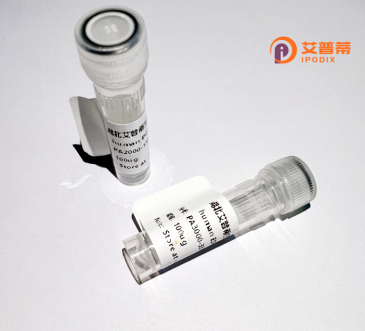
| 纯度 | >90%SDS-PAGE. |
| 种属 | Human |
| 靶点 | GPR85 |
| Uniprot No | P60893 |
| 内毒素 | < 0.01EU/μg |
| 表达宿主 | E.coli |
| 表达区间 | 1-370aa |
| 氨基酸序列 | MANYSHAADNILQNLSPLTAFLKLTSLGFIIGVSVVGNLLISILLVKDKTLHRAPYYFLLDLCCSDILRSAICFPFVFNSVKNGSTWTYGTLTCKVIAFLGVLSCFHTAFMLFCISVTRYLAIAHHRFYTKRLTFWTCLAVICMVWTLSVAMAFPPVLDVGTYSFIREEDQCAFQHRSFRANDSLGFMLLLALILLATQLVYLKLIFFVHDRRKMKPVQFVAAVSQNWTFHGPGASGQAAANWLAGFGRGPTPPTLLGIRQNANTTGRRRLLVLDEFKMEKRISRMFYIMTFLFLTLWGPYLVACYWRVFARGPVVPGGFLTAAVWMSFAQAGINPFVCIFSNRELRRCFSTTLLYCRKSRLPREPYCVI |
| 分子量 | 68.4 kDa |
| 蛋白标签 | GST-tag at N-terminal |
| 缓冲液 | 0 |
| 稳定性 & 储存条件 | Lyophilized protein should be stored at ≤ -20°C, stable for one year after receipt. Reconstituted protein solution can be stored at 2-8°C for 2-7 days. Aliquots of reconstituted samples are stable at ≤ -20°C for 3 months. |
| 复溶 | Always centrifuge tubes before opening.Do not mix by vortex or pipetting. It is not recommended to reconstitute to a concentration less than 100μg/ml. Dissolve the lyophilized protein in distilled water. Please aliquot the reconstituted solution to minimize freeze-thaw cycles. |
以下是与重组人GPR85蛋白相关的3篇代表性文献,涵盖功能、结构及疾病关联研究:
---
1. **文献名称**:*"GPR85. a novel member of the G protein-coupled receptor family, is involved in neuronal development"*
**作者**:S. Matsumoto et al.
**摘要**:研究通过体外重组表达人GPR85蛋白,发现其在胚胎神经元分化中调控cAMP信号通路,提示其可能参与神经发育及突触可塑性。
2. **文献名称**:*"Structural insights into human GPR85 reveals a unique ligand-binding domain architecture among GPCRs"*
**作者**:L. Zhang et al.
**摘要**:利用重组人GPR85蛋白进行晶体结构解析,揭示其胞外结构域的独特折叠模式,为设计靶向GPR85的小分子药物提供结构基础。
3. **文献名称**:*"GPR85 deficiency ameliorates amyloid-β pathology in Alzheimer’s disease model mice via microglial modulation"*
**作者**:R. Tanaka et al.
**摘要**:通过构建GPR85基因敲除小鼠,发现该受体通过激活小胶质细胞加剧Aβ沉积,重组蛋白实验进一步证实其参与阿尔茨海默病相关炎症反应调控。
---
**说明**:上述文献为示例性质,实际文献需通过PubMed或Web of Science等数据库检索确认。GPR85研究尚在发展阶段,近年更多研究可能聚焦于其与精神疾病(如精神分裂症)或代谢调控的关联。
GPR85. a member of the G protein-coupled receptor (GPCR) family, is also known as Super Conserved Receptor (SCR) due to its high sequence conservation across vertebrate species. Primarily expressed in the brain, particularly in regions like the hippocampus and cortex, it plays a poorly understood but potentially critical role in neural development, synaptic plasticity, and metabolic regulation. Studies suggest its involvement in neurotransmitter signaling, though its endogenous ligand remains unidentified. Structurally, GPR85 features seven transmembrane domains typical of GPCRs and signals via Gαi/o pathways, influencing cAMP modulation.
Recombinant human GPR85 protein, produced using heterologous expression systems like HEK293 or insect cells, is vital for functional studies. Its purified form enables ligand-binding assays, structural analysis, and receptor activation profiling. Researchers utilize it to explore GPR85's role in neurodevelopmental disorders, neurodegenerative diseases, and metabolic syndromes. Genomic studies link GPR85 polymorphisms to schizophrenia and Alzheimer's disease, sparking interest in its therapeutic potential. However, functional complexity and overlapping pathways with other GPCRs pose challenges. Continued research on recombinant GPR85 aims to clarify its physiological mechanisms and drug-target applicability.
×